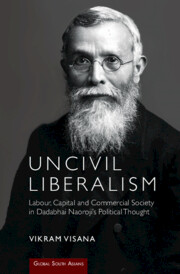Book contents
- Frontmatter
- Dedication
- Contents
- List of Abbreviations
- Acknowledgements
- Introduction
- 1 Sociality in an Imperial and Industrial Age
- 2 Sociality and the Parsis of Western India
- 3 Civil Society and Social Reform
- 4 Conceptualizing the Drain Theory
- 5 Making Commercial Society in India
- 6 Making Commercial Society in Britain
- 7 The Afterlives of Naoroji’s Political Thought
- Conclusion
- References
- Index
Conclusion
Published online by Cambridge University Press: 27 September 2022
- Frontmatter
- Dedication
- Contents
- List of Abbreviations
- Acknowledgements
- Introduction
- 1 Sociality in an Imperial and Industrial Age
- 2 Sociality and the Parsis of Western India
- 3 Civil Society and Social Reform
- 4 Conceptualizing the Drain Theory
- 5 Making Commercial Society in India
- 6 Making Commercial Society in Britain
- 7 The Afterlives of Naoroji’s Political Thought
- Conclusion
- References
- Index
Summary
Naoroji travelled to Amsterdam and Stuttgart in 1904 and 1907 to participate in the two Congresses of the Socialist International. Invited by the organizers to represent the ‘East’, Naoroji was keen to promulgate his analysis of uncivil liberalism far and wide but demanded that Hyndman make it clear to his leftist colleagues that this was a ‘direct personal invitation independent of Socialism as Socialism’. With this qualification established, Naoroji and Hyndman co-authored a resolution for the 1904 gathering that carefully steered the former's politics away from any association with revolutionary action, calling instead for the ‘abandonment’ of the ‘nefarious system’ of exploitation. Naoroji even edited the initial draft Hyndman sent to him by adding the gradualist qualification of ‘present nefarious system’, signalling his continued faith in a reformed British Empire. To his last, Dadabhai remained a reformer holding out hope for a redeemed liberal order in which labour – and its powers of social reproduction – were restored to their natural condition.
This book began by summarizing exclusionary ‘official liberalism’ as well as the wider British post-Enlightenment debates about the civil and commercial registers of modern sociality. The first chapter also considered the romanticist critics of these registers before considering how far these ideas were convincing beyond Europe. The following chapter explored the nineteenth-century Parsi life-world with a focus on faith, commerce and philanthropy as engines of civil interdependence in the context of brewing social and communal tensions. We saw how Naoroji matured into a community that was in a state of political and social flux. We then examined the fragility of this world as the eyes of young Parsi professionals like Naoroji turned to debates on community governance and social reform in an effort to define their minority's boundaries and internally stabilize its social norms. This was achieved by challenging the domination of the Parsi panchayat with a self-regulating civil society based on liberal self-fashioning and individual autonomy guaranteed by property ownership. Chapter 4 recounted the financial collapse, personal bankruptcy and famine that prompted Naoroji to formulate his iconic drain theory as a model of commercial society through statistical liberalism. This pivot to political economy allowed him to conceptualize what individual labour and contract in India might look like when abstracted from the ethnographic groupings and customary categories of colonial liberalism.
- Type
- Chapter
- Information
- Uncivil LiberalismLabour, Capital and Commercial Society in Dadabhai Naoroji's Political Thought, pp. 202 - 207Publisher: Cambridge University PressPrint publication year: 2022

